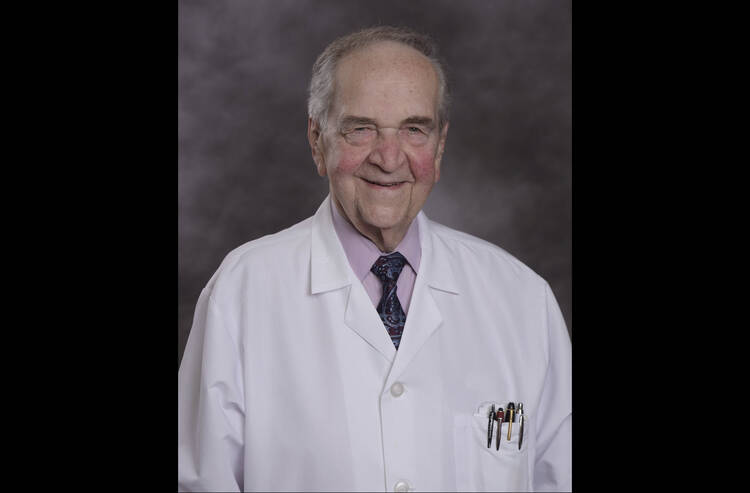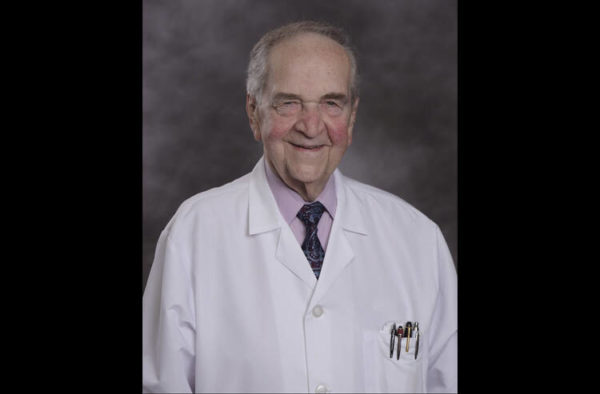Dr. Michael Brescia, ‘apostle to the dying’ and hospice trailblazer, dies at age 90
John Burger – OSV NewsMay 03, 2023F

Dr. Michael Brescia, executive medical director emeritus at Calvary Hospital in the Bronx, New York, is seen in an undated photo. A kidney dialysis pioneer who was widely considered the a “co-founder of modern hospice and palliative care in America,” Brescia died April 19, 2023, at age 90. (OSV News photo/courtesy Calvary Hospital)
Dr. Michael Brescia, who prescribed love as an antidote to calls for assisted suicide, died at his home in Yorktown Heights, New York, surrounded by immediate family the evening of April 19. He was 90.
Brescia “was a real apostle to the dying,” said New York Cardinal Timothy M. Dolan in a video message April 24, the day of Brescia’s funeral at St. Patrick’s Church in Yorktown Heights.
For more than 50 years, Brescia faithfully served thousands of patients at Calvary Hospital, an acute care specialty hospital in the New York borough of the Bronx devoted exclusively to providing palliative care to adult patients with advanced cancer and other life-limiting illnesses. He first joined the staff in 1962 as an attending physician and was appointed executive medical director in 1994, a position he held until December 2019.
Calvary in a statement said Brescia “is widely considered a co-founder of modern hospice and palliative care in America.” The late doctor “always spoke of administering God’s comfort.” He embraced the staff and advised them all to “serve joyously and faithfully” and “always relieve physical and spiritual pain,” the hospital said. “His favorite place was with a patient,” it added.Calvary in a statement said Brescia “is widely considered a co-founder of modern hospice and palliative care in America.”Tweet this
He was predeceased by his wife, Monica. Among their six children there are three physicians, and one of their nine grandchildren is a doctor.
In the early days of his medical career, he was a pioneer in kidney dialysis. As a young physician with a degree from Georgetown University’s School of Medicine in Washington, Brescia helped discover a way to help patients with kidney failure. The procedure allowed a network of veins to act like arteries, increasing the time a patient could receive dialysis until a match for a donor kidney could be found.
Named for him and his co-inventor, Dr. James Cimino, the Cimino-Brescia Arterial Fistula is still used today and is said to have saved the lives of tens of millions of people. Brescia and his colleagues had a chance to become very wealthy by selling the idea to a pharmaceutical company. He proudly went home to tell his Italian immigrant father about it.
But the pharmaceutical required the inventors to “keep it secret for one year so they could prepare to open dialysis centers around the world at the same moment,” Brescia recalled in 2017, when he received the Cardinal O’Connor Award from the Sisters of Life.As Brescia related in a talk at the New York Encounter in 2018, his father reasoned that God gave him the ability to invent the procedure.Tweet this
Brescia’s father urged him to give the invention away. As Brescia related in a talk at the New York Encounter in 2018, his father reasoned that God gave him the ability to invent the procedure, so he had no right to hold up its delivery to people in danger of death. The elder Brescia warned his son that if he allowed the company to hold it up, every time he went to shave, he would see in the mirror the faces of children whose parents had died because of his insistence on making a lot of money.
So instead of making a deal with the company, Brescia and Cimino published an article about it in The New England Journal of Medicine in 1966.
For the rest of his life, Brescia saw medicine as an act of giving away the gifts God had given him. Rather than taking a prestigious job at another hospital, Brescia went to work at the House of Calvary in the New York City borough of the Bronx, a then-obscure place run by the Dominican Sisters of the Sick Poor. It would soon become Calvary Hospital, where, as medical director, Brescia would oversee the implementation of a methodology to sustain the lives of terminal patients in peace and happiness until their natural death. Brescia’s approach has been upheld as an answer to calls for physician-assisted suicide and euthasia.Key to his approach were touching patients and holding the dying, and the faithful presence of caregivers—both to the patient and the family.Tweet this
He transformed the New York institution, which was founded in 1899, into a “world leader in end-of-life medical care.” Cimino also ended up at Calvary, as director of the Palliative Care Institute.
In his practice and in public advocacy against physician-assisted suicide on the state level and nationally (New York state has not yet approved an assisted suicide bill), Brescia insisted that pain—even the worst kinds of pain from cancer—can always be taken care of with drugs. What can be more challenging—and which Calvary strove to address—was the suffering that comes from depression, fear, loneliness and a sense of abandonment. The spiritual and emotional response—and just human love—is just as important a part of medicine as the clinical response, Brescia always said.
Key to his approach were touching patients and holding the dying, and the faithful presence of caregivers—both to the patient and the family.
“I’m never going in a room with a syringe filled with death,” he once told a gathering of doctors. “I’m going in and putting these people in my arms, immersing them in a pool of love.”







